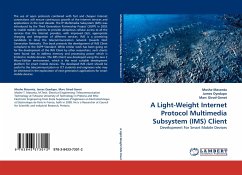While the coverage of area-wide wireless networks is
becoming more and more common
the number of mobile devices is also increasing.
Thereby the possible field of
application for wireless devices increases and
provides new potentials to support their
users in their everyday life. This also implicates
the advancement of the underlying
design and principles of communication of wireless
devices within wireless networks.
One of these communications technologies is
Communicating Sequential Processes
for Java (JCSP). In this book I adress the
principles of JCSP in general and two
extensions, namely JCSP.Net and JCSP.mobile, in
particular. Thereby the already existing
functionality of static client process loading will
be investigated and as a result of
this the functionality will be enhanced to cope with
dynamic loading of multiple client
processes. The result will then be evaluated by means
of an exemplary implementation
which in turn shall prove of its value. The
importance of the JCSP package will therby
be emphasised.
becoming more and more common
the number of mobile devices is also increasing.
Thereby the possible field of
application for wireless devices increases and
provides new potentials to support their
users in their everyday life. This also implicates
the advancement of the underlying
design and principles of communication of wireless
devices within wireless networks.
One of these communications technologies is
Communicating Sequential Processes
for Java (JCSP). In this book I adress the
principles of JCSP in general and two
extensions, namely JCSP.Net and JCSP.mobile, in
particular. Thereby the already existing
functionality of static client process loading will
be investigated and as a result of
this the functionality will be enhanced to cope with
dynamic loading of multiple client
processes. The result will then be evaluated by means
of an exemplary implementation
which in turn shall prove of its value. The
importance of the JCSP package will therby
be emphasised.








